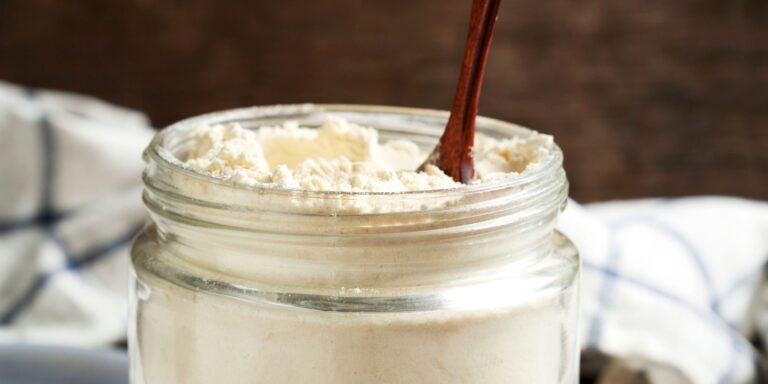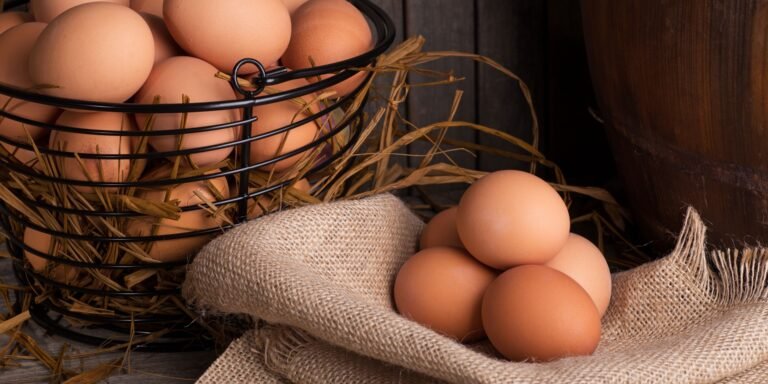Ultimate Guide To Storing Powdered Eggs For Emergencies
This post may contain affiliate links, full disclosure here.
Eggs are a great source of protein because they provide at least six grams each serving. As a result, the American Egg Board advises that eggs be included in a daily basic diet.
Eggs are high in protein, but they also include important vitamins and minerals. These vitamins and minerals help different human organs, such as the liver, function properly.
Without a doubt, eggs should be an important part of our diet, but the long-term viability of fresh eggs, particularly as emergency food, is a contentious issue. When refrigerated, fresh eggs have a shelf life of three weeks.
Fresh eggs have a short shelf life, which is incompatible with survivalist requirements in an emergency. Fortunately, powdered eggs can be used in place of fresh eggs.
What are powdered eggs?
Powdered has come a long way and is now widely accepted in the United States.
So, let’s start with some background information on egg powder.
Powdered eggs have a long and illustrious history. The practice of drying and keeping eggs dates back to the mid-twentieth century. During World War II, this method of keeping fresh eggs earned a reputation for its worth.
Powdered eggs were utilized to feed citizens displaced by the war, saving many people who could survive on powdered eggs and other consumables.
Powdered eggs are still used as an emergency food by survivalists as a source of protein and critical vitamins and minerals.
As if that wasn’t bad enough, during rationing, the US government utilized powdered eggs.
During difficult times, the government also provided powdered eggs to civilians in order to conserve fresh eggs for military personnel.
Powdered eggs Benefits
Powdered eggs are just fresh eggs that have been dried and ground into a powder.
Fresh eggs are not feasible when camping, hiking, or in a food emergency, making powdered eggs a useful food asset.
Although your fresh eggs are delicious and nutritious, they are not appropriate in all circumstances. Fresh eggs, for example, must be kept refrigerated if they are to last a few weeks. Powdered eggs are a good replacement for survival in times of calamity due to the need for refrigeration to lengthen their shelf life.
Due to their nutritious value and extended shelf life, powdered eggs are a suitable substitute for fresh eggs. Furthermore, powdered eggs provide the same nutritional content as fresh farm eggs, and powdered eggs are a conveniently available food source during emergencies.
Many of the drawbacks of fresh eggs are overcome using powdered eggs. They’re easier to transport and store because they’re not as fragile as fresh eggs. Powdered eggs also offer a level of convenience that is uncommon with fresh eggs.
Consider getting up in the morning, anticipating a breakfast of scrambled eggs, only to discover that the last three eggs have already been used. You won’t have to worry about this if you have powdered eggs in your pantry.
A shrewd survivalist always prepares for the future. Powdered eggs are all about sustainability and reliability. You can prepare a nutritious meal anywhere at any time.
It is impractical to consider fresh eggs for long-term survival preparations, making powdered eggs famous for multiple reasons. First, you can use them in almost any recipe that requires eggs despite being in powder form.
Second, if you’re in a pinch and don’t have any farm-fresh eggs on hand, you can make any meal with egg powder. Isn’t that amazing?
On the market, there are a variety of powdered egg brands to choose from. Powdered eggs can be ordered online with a few clicks or purchased at most large grocery stores.
ReadyWise offers a variety of powdered egg products, whether you need a large number or a small amount. If you’re being prudent, the ReadyWise Wise Choice Bundle can be used as an emergency kit.
How are powdered eggs made?
Have you ever tried powdered milk?
Powdered eggs are made using the same process as is used to make powdered milk. Powdered eggs, like powdered milk, aim to dehydrate fresh goods in order to improve their shelf life.
Let’s brush up on our scientific knowledge. Glucose levels in eggs are increased. During warm storage, the Maillard reaction occurs, in which existing glucose interacts with the protein.
The interaction of glucose and protein in the eggs reduces the flavor. The brown discoloration is a side effect of this process. Nothing is more unpleasant than bland eggs. Manufacturers remove the glucose from the eggs through a dehydration procedure to prevent this de-flavoring.
Now that you’ve grasped the basics of science, it’s time to learn about the actual process of making powdered eggs.
Using a spray drying method to make powdered eggs is a sensitive but simple operation. Although dried eggs are made in a similar way to powdered milk, they go a step further–beyond mere pasteurization.
Desugarization is the initial step. To avoid an unfavorable reaction with protein, depolarization removes any existing glucose in the egg. Before spray drying the eggs, you must complete this critical step. If you skip this step, you’ll end up with a bland powdered egg.
Powdered eggs can be made using either the whole egg or simply the yolk. Some goods include both powdered egg yolk and powdered egg white. For many people, dehydration is the greatest way to extract all of the nutrients from fresh eggs in a powder form.
Spray drying can be done in two ways: pan-dried or freeze-dried. The most frequent and efficient method for creating powdered eggs is pan-drying.
Depending on your preferences, you can find a range of powdered egg products on the market. The following are the primary retail categories available:
white powdered eggs
Whole egg and yolk powdered
White egg and yolk mixtures with carbs
Pan-dried eggs produce the best-powdered eggs since they are devoid of moisture. Powdered eggs are almost impossible to burn due to the moisture removal process.
Powdered eggs-pros and cons
As survivalists know, powdered eggs come be helpful in a variety of situations, so stay up to date on the latest information on this practice.
Here are several advantages and disadvantages of powdered eggs that every survivalist should be aware of:
Pros
- You won’t have to worry about eggs breaking because they’re easy to store and handle. They also take up less room in storage.
- Cost-effective: The majority of powdered egg products are inexpensive.
- They don’t need to be thawed and are ready to use in any condition; all you have to do is rehydrate them with water. Powdered eggs are a feasible alternative means of survival when little other food sources are available, whether in an emergency or just in a hurry.
- When handling powdered eggs, you don’t have to contact the powder and risk transmitting germs.
- Long life expectancy. Powdered eggs can be safely stored for up to a decade. You can buy powdered eggs in quantity and keep them on hand in case of an emergency.
- You can always add more powdered eggs to your stash if you run out.
- Powdered eggs are lightweight and can be stacked for long-distance shipment. When going on a trek or doing any other outdoor activity, you can carry them in a backpack.
- Powdered eggs are versatile and can be used in a variety of recipes. Powdered eggs are a simple and inexpensive alternative to whole eggs when baking or producing other egg-based dishes. They’re quite easy to combine with other ingredients.
- Gluten-free: This flour can be used to make gluten-free baked goods.
Cons
- There are concerns about possible higher amounts of oxidised cholesterol, which could affect arteries.
- Freshness of flavour may be lost.
Where and how to use powdered eggs
Powdered eggs are a very adaptable food supply for individual survivalists, families, and businesses.
Furthermore, many hospitals utilise this meal to feed their patients, and other institutions such as restaurants and the military include powdered eggs in their menus.
People in their houses utilise these eggs to make quick meals or in case of an emergency. In addition, powdered eggs are commonly carried by campers, hikers, and other outdoor enthusiasts for usage in the wild because they are lightweight and nutritious.
Powdered eggs are convenient for bakeries to use in their goods. Powdered eggs are used in baked goods because they are easy to combine with other ingredients.
Powdered eggs are easy to work with. If you’re going on an outdoor adventure, you can prepare a simple supper in just a few minutes.
When using powdered eggs, follow these simple instructions:
- In a mixing basin, combine the powdered eggs and water. For best results, make sure the water is at room temperature. The ratio for good preparation for everyday use is 1:2:1. To two teaspoons of water, add one tablespoon of powdered egg. Depending on the amount of food you want, you can use alternative ratios like 2:4.
- Reassemble the eggs as follows: Allow the eggs to rehydrate for baking for a few minutes after combining.
- Continue cooking or baking after mixing your prepared eggs with the remaining ingredients in your recipe.
- Pour the egg mixture onto a hot frying pan with some cooking oil if you want scrambled eggs.
How long can powdered eggs last?
Powdered eggs have a long shelf life of five to ten years, making them a nonperishable food.
The lifetime of powdered eggs, on the other hand, is largely determined by how properly you store this product. Because of the reaction of the protein with carbs, they have a shorter shelf life in hot environments.
Powdered eggs have a longer shelf life when stored airtight in anaerobic conditions. It also lowers the risk of contamination by harmful germs that cause disease or poor health effects.
When powdered eggs are opened, their shelf life is reduced to a few weeks or months, exactly like other dried products. If you open a powdered egg packet and want to store the remaining contents for a long time, repack them in an airtight container.
Repackaging them in an airtight or vacuum-sealed package will give them an extra few weeks of shelf life. Finally, be sure that any packing is free of moisture and oxygen.
Bottom Line Powdered Eggs For Emergency Storage
Powdered eggs are the way to go, despite some concerns about cholesterol oxide and the loss of fresh taste.
Egg powder has the same nutritious value as whole eggs, but with the added benefits of a longer shelf life and ease of preparation. Egg powder can be used in a variety of ways, including baking, scrambling eggs, and general cooking.
Powdered eggs’ benefits outweigh their drawbacks, making them a must-have item for any serious survivalist.
Powdered eggs are a great way to prepare for unexpected crises, camping, or hiking because they last a long time.







